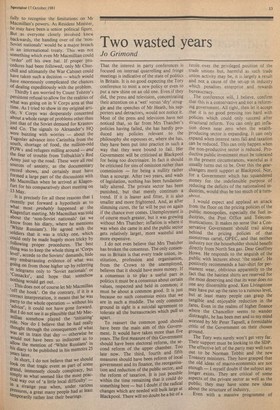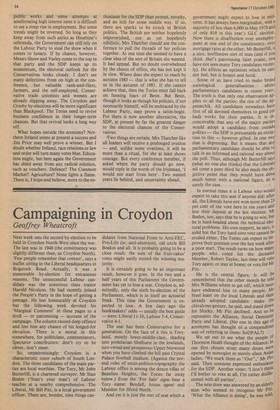Two wasted years
Jo Grimond
That the interest in party conferences is focused on internal quarrelling and fringe meetings is indicative of the state of politics in Britain. It is no good expecting the Tory conference to mint a new policy or even to put a new shine on an old one. Even if they did, the press and television, concentrating their attention on a 'wet' versus 'dry' struggle and the speeches of Mr Heath, his supporters and detractors, would not notice it. Most of the press and television have not noticed that, so far from Mrs Thatcher's policies having failed, she has hardly produced any policies relevant to the philosophy she espouses or, where she has, they have been put into practice in such a way that they were bound to fail. Her Government will be criticised at Blackpool for being too doctrinaire. In fact it should be criticised for sins of omission rather than commission — for being a nullity rather than a scourge. After two years, and wads of legislation, nothing has been fundamentally altered. The private sector has been punished, but that merely continues a trend. If it is leaner and fitter, it is also smaller and more frightened. And, as after slimming cures, the fat will be put on again if the chance ever comes. Unemployment is of course much greater, but it was growing without Mrs Thatcher; inflation is where it was when she came in and the public sector gets relatively larger, more wasteful and more expensive. I do not even believe that Mrs Thatcher has broken the consensus. The only consensus in Britain is that every trade union, institution, profession and organisation, from the Crown to the unemployed, believes that it should have more money. If a consensus is to play a useful part in politics it must be a consensus about certain values, respected and held in common; it must be about a common good. It is just because no such consensus exists that we are in such a muddle. The only common ground in sight is a suicidal agreement to tolerate all the bureaucracies which pull us apart. To reassert the common good should have been the main aim of this Government. It would have taken more than five years. The first measure of this Government should have been electoral reform, the second reform of the upper chamber. Too late now. The third, fourth and fifth measures should have been reform of local government and its finance, the reorganisation and reduction of the public sector, and the reform of taxation. It is just possible within the time remaining that it could. do something here — but I doubt if the radical changes which are needed will bulk large at Blackpool. There will no doubt be a bit of a tussle over the privileged position of the trade unions but, harmful as such trade union activity may be, it is largely a result and not a cause of the set-up in industry which penalises enterprise and rewards bureaucracy.
The conference will, I believe, confirm that this is a conservative and not a reforming government. All right, then let it accept that it is no good pressing too hard with Policies which could only succeed after structural reform. You can only get inflation down near zero when the wealthproducing sector is expanding. It can only expand when interest rates fall and taxation can be reduced. This can only happen when the non-productive sector is reduced. Productive public investment must be tolerated in the present circumstances, wasteful as it usually turns out to be. Over this the gearchangers merit support at Blackpool. Nor, for a Government which has squandered money for the indefensible purpose of in dustries, the deficits of the nationalised would thus be too much of a turn about.
I would expect and applaud an attack from the floor on the pricing policies of the public monopolies, especially the fuel industries, the Post Office and Telecommunications. It makes no sense that a Conservative Government should trail along behind the pricing policies of that monstrous cartel, OPEC, and that neither industry nor the householder should benefit directly from North Sea gas. Dear Geoffrey Howe. He responds to the anguish of the public with lectures about 'the snake'. He Positively recommends a hair-shirt for permanent wear, oblivious apparently to the fact that the hairiest shirts are reserved for the most deserving and that its wear does no one any discernible good. Ken Livingstone may have put up the rates to a ruinous level, but at least many people can grasp the tangible and enjoyable reduction in the fares. Even in the realms of higher finance where the Chancellor seems to wander distraught, he has been met and to my mind worsted by Mr Peter Tapsell, a formidable critic of the Government on their chosen ground.
The Tory wets surely won't get very far. Their support must be looking to the SDP. The effective left of the party may well turn out to be Norman Tebbit and the new Treasury ministers. They have grasped that the old ideas of macro-economics are not enough — I myself doubt if the subject any longer exists. They are critical of some aspects of the private sector as well as the public; they may have some new ideas about the structure of industry. Even with a massive programme of public works and some attempts at ameliorating high interest rates it is difficult to see a steep rise in employment. But some trends might be reversed. So long as they keep away from such antics as Heseltine's referenda, the Government can still rely on the Labour Party to steal the show when it comes to lunacy. If by chance, however, Messrs Shore and Varley come to the top in that party and the SDP keeps up its momentum, the electoral outlook for the Conservatives looks cloudy. I don't see many defections from on high at the conference, but valuable rank-and-filers, farmers, and the self-employed, Conservative trade unionists and women are already slipping away. The Croydon and Crosby by-elections will be more significant than Blackpool. The Tories need to revive business confidence in their longer-term chances. But that revival looks a long way off.
What hopes outside the economy? Northern Ireland seems at present a success and Jim Prior may well prove a winner. But I doubt whether Ireland, race relations or law and order will turn many votes blue. Education might, but here again the Government has shied away from any radical solution, such as vouchers. Defence? The Common Market? Agriculture? None lights a flame. There is, I hope and believe, more to the en thusiasm for the SDP than protest, novelty, and an itch for some middle way. If so, there are sparks to be struck in British politics. The British are neither hopelessly impoverished, nor as yet hopelessly nihilistic. Mrs Thatcher should use the conference to pull the threads of her policies together. At one time she seemed to have a clear idea of the sort of Britain she wanted. It had appeal. But no doubt overwhelmed by the chores of office, she has not kept it in view. Where does she expect to reach by autumn 1983 — that is what she has to tell us in the autumn of 1981. If she cannot achieve that, then the Tories must fall back on fanning fears of Benn. But Benn, though it looks as though his policies, if not necessarily himself, will be embraced by the Labour Party, may prove a tattie-bogle. For there is now another alternative, the SDP, at present by far the greatest danger to the electoral chances of the Conservatives.
Two things are certain. Mrs Thatcher like all leaders will receive a prolonged ovation — and, unlike some ovations, it will be more than a ritual, for she at least shows courage. But every conference member, if asked where the party should go now, would reply in the words of the Irishman, 'I would not start from here'. Two wasted years lie behind, and uncertainty ahead.







































 Previous page
Previous page